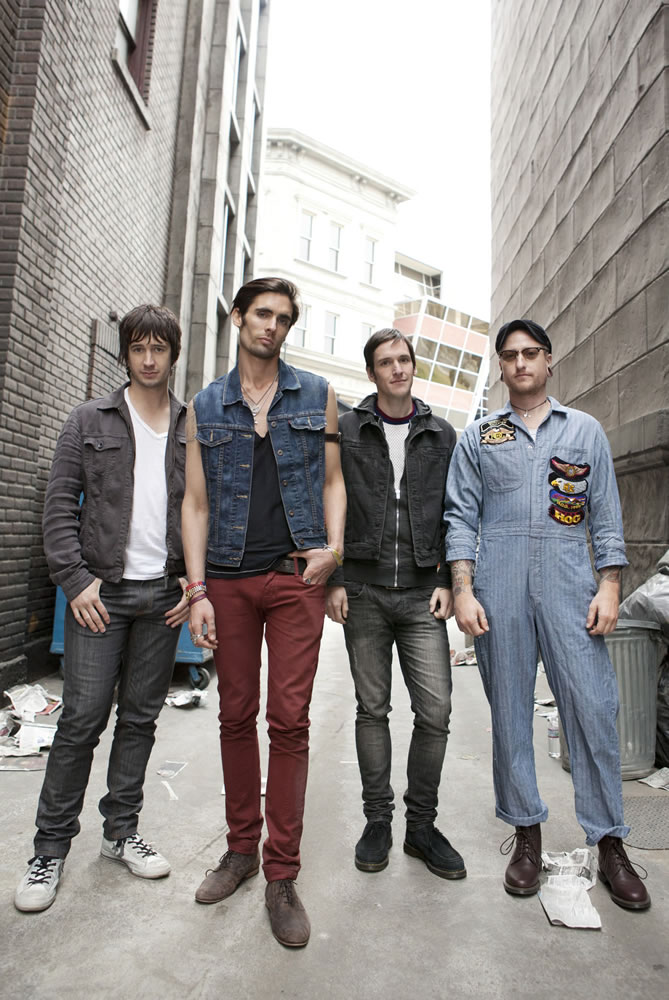o What: All-American Rejects in concert with Boys Like Girls.
o When: 8 p.m. Oct. 28.
o Where: McMenamins Crystal Ballroom, 1332 W. Burnside St., Portland.
o Cost: $25 through Cascade Tickets, 855-227-8499 or online.
o Information: 503-225-0047 or online.
Tyson Ritter probably wouldn’t mention his name in the same breath with that of John Lennon when it comes to songwriting and music.
That’s not a slight to Ritter or his band, the All-American Rejects. That group has had considerable success in its first decade, notching a half-dozen modern rock singles and selling some 10 million copies worldwide of its three CDs — 2003’s self-titled debut, 2005’s “Move Along” and 2008’s “When The World Comes Down.” That’s not on a level with the Beatles (Lennon’s band, of course), but it’s not too shabby, either.
But with the All-American Rejects having recently released its fourth CD, “Kids in the Street,” Ritter said he sees a parallel between what he’s been through in his life recently and Lennon’s life.
o What: All-American Rejects in concert with Boys Like Girls.
o When: 8 p.m. Oct. 28.
o Where: McMenamins Crystal Ballroom, 1332 W. Burnside St., Portland.
o Cost: $25 through Cascade Tickets, 855-227-8499 or online.
o Information: 503-225-0047 or online.
“I had my lost weekend, as Lennon would have said,” Ritter said. “I think it was necessary, man. I think you have to lose yourself to find yourself. I think that’s sort of, if I hadn’t done it to get here, where I am today, then I’d feel like I’d still be lost somewhere else.”
Lennon, of course, is famous for his “lost weekend,” an 18-month stretch between 1973 and 1975 when he was separated from his wife, Yoko Ono, and lived in Los Angeles and New York with a girlfriend, May Pang. Lennon did a lot of studio work during this time, completing three solo albums, among other projects. But he also did his share of carousing, famously getting thrown out of the Troubadour Club in Los Angeles for misbehavior with his friend and fellow partyer, singer/songwriter Harry Nilsson.
Ritter didn’t have any such incidents of public misbehavior, but on a few levels, the singer/keyboardist went through a similar period after the All-American Rejects finished touring behind “When The World Comes Down,” a CD that included the blockbuster hit single “Gives You Hell.”
Coming off the road, Ritter felt lost and decided to turn his life inside out, leaving his former home base of Florida for Los Angeles.
“I was so domesticated,” he said. “I moved to Florida. I had this lovely girlfriend that acted like a wife. I wore white linen and sat on the beach and had beers. It was just the whole 40-year-old retiree life. So I moved out to Los Angeles, and in doing so, I just sort of got sucked in, into whatever you can let yourself get sucked into, a little too (much). I must have been caught up in the glare of too many sunrises. But I left my girlfriend. I left my manager of eight years. I just decided to clean house, spiritually, emotionally and personally.”
Ritter, 28, didn’t go into too many specifics about living the life of a Los Angeles newcomer with no romantic commitments and a measure of fame. But after awhile, he realized life in Los Angeles wasn’t doing him any favors, and he packed up and headed for New York City. That’s where he found his groove as a songwriter and in his life.
“When I sort of realized that Los Angeles wasn’t doing good for me, I ran away to New York, and sort of made peace with the city,” he said. “And honestly, that city, I jumped on a skateboard and chased pavement for hours and hours a day and just sort of listened to the city and she sang songs to me. And I’d go back up in my little loft, and I’d play my organ and write some music.”
Hooking up with his songwriting partner in the band, guitarist Nick Wheeler, the pair held several songwriting sessions in various secluded locations in the Northeast and emerged with the songs that make up the “Kids in the Street” CD.
“Kids in the Street” retains the youthful, highly catchy rocking pop sound of the first three CDs by the All-American Rejects, which also includes guitarist Mike Kennerty and drummer Chris Gaylor. Big and bold tunes such as “Walk Over Me” and “Someday’s Gone” sound like they could follow such earlier hits as “Swing Swing,” “Dirty Little Secret” and “Gives You Hell” onto modern rock radio. But there’s an appealing new restraint to songs li such as “Fast & Slow,” “Out The Door” and the title song that, coupled with ballads like “Affection” and “Heartbeat Slowing Down,” gives the new CD a variety and a flow that was lacking on earlier albums by the band.
The new material is also bringing more highs and lows and a greater sense of dynamics to the band’s concerts, Ritter said.
“I think this record provides a more grand show because the (new) record itself is sonically more grand,” Ritter said. “I think if you’re at the show, you’re going to leave, your body’s going to be sore and you’re going to wake up with your ears ringing. You’re going to feel like you were at a real show, where your face hurts from smiling.”



